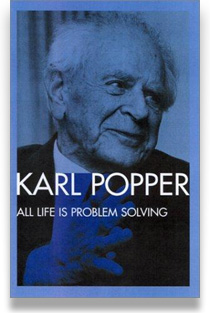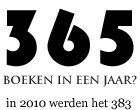All Life Is Problem Solving ~ Karl Popper
Een nadeel aan boeklog is dat het op 1 januari 2005 begon, en dit betrekkelijk laat was in mijn lezende leven. Aan canon is voor die tijd al veel gepasseerd. En hoewel het ware lezen voor mij uit herlezen bestaat, zijn er toch nogal wat grote werken die ik niet opnieuw hoef in te zien. Of wil bekijken. Die boeken zijn van nut geweest. Hebben meegeholpen om me te vormen, en dat was dat.

Tot de boeken die ik de eerstkomende jaren, en misschien wel decennia, niet herlezen zal, ondanks het vele wat ze me eerder brachten, horen de grote werken van Karl Popper [1902 – 1994]. Of dat nu Logik der Forschung (The Logic of Scientific Discovery) is, of het tweeluik The Open Society and Its Enemies en The Poverty of Historicism. De kernen van wat Popper daarin betoogt, horen tot mijn intellectuele bagage. Zonder dat ik daarmee zeggen wil diens ideeën altijd goed te representeren.
Bestaan er gelukkig vaak ook nog bijboeken in zo’n oeuvre. En dan heeft de bundel All Life Is Problem Solving zeker aantrekkelijke kanten om te lezen. Dit boek biedt een verzameling van gelegenheidswerk uit de jaren tachtig en negentig. En Popper was bijvoorbeeld éen van de vroege criticasters van het communisme die na 1989 nogal eens gevraagd werd om zijn mening over de val van deze heilsleer.
Er staan essays in, lezingen, feestredes van als Popper weer eens ergens eredokter was geworden, en éen interview. Voor de helft gaan deze stukken over geschiedenis en politiek, en voor de andere helft over wetenschapsfilosofie. Al gebruikt Karl Popper tegelijk die laatste term niet voor zijn werk. De slotlezing in het boek is amusant getiteld: ‘How I became a philosopher without trying’. Veel van de onderzoeksvragen die hem al vroeg interesseerden, bleken namelijk tot de filosofie te worden gerekend. En dat was nieuws voor de man.
Omdat de opgenomen stukken meestal voor een algemeen publiek bedoeld waren, boden ze mij strikt geredeneerd inhoudelijk niet veel nieuws. Als inleiding in het werk zijn ze evenwel prima geschikt, vanwege de toegankelijkheid. Maar dan nog bleef er ook voor mij genoeg te genieten, aan gedachten en formuleringen. Ik tekende onder meer aan:
Over de natuurwetenschappen:
We know nothing — that is the first point.
Therefore we should be very modest — that is the second.
That we should not claim to know what we do not know — that is the third.
This is more or less the approach I should like to popularize. It does not have good prospects. [56]

Over zijn politieke ideeën en idealen:
I say: Kant told us, ‘Dare to be wise!’ I may perhaps, more modestly, tell you: Dare to despise fashions, and be a little more responsible each day. This is, perhaps, the best you can do for freedom. [138]

En omdat het zo mooi het verschil toont tussen een journalist en iemand die wel eens nadenkt:
SpiegelAre economic conflicts nowadays the continuation of war by other means? Europe and the USA are afraid they are losing the microchip war against the Japanese.
PopperThese problems should not be taken seriously, and they should not be discussed in this way. It is what I have called the cynical view of history: intellectuals want to be clever instead of offering help. The Japanese are really civilized. You can talk to them. But time and again we are up against stupidity, both here and of course in Japan too.
SpiegelStupidity? Do you mean strategies of economic consequences?
PopperYes. Japan has big problems: it is overpopulated. But that can be discussed later. Unfortunately there are always journalists who misunderstand these things and are looking for a sensation. We have enough sensations already.
SpiegelBut it has simply not been invented by journalists. The current ‘Don’t buy Japanese goods!’ campaign in the USA suggests a deep sense of confrontation.
PopperSuch a confrontations is nonsense. The whole thing is unimportant. At present Japan is not at all imperialistic. True, it has the industry and the potential to manufacture nuclear weapons at any time. But the Japanese know what this would mean.
In my view, theoretical economics has ground to a kind of intellectual halt; it has become bogged down in current problems. But the problems can all be solved. No millionaire has yet died of riches. And compared to the prewar world, you in Germany are all millionaires now.



















 RSS feeds
RSS feeds